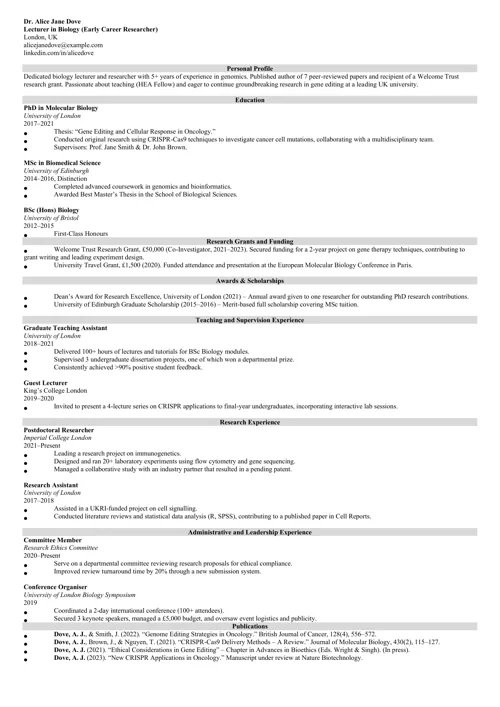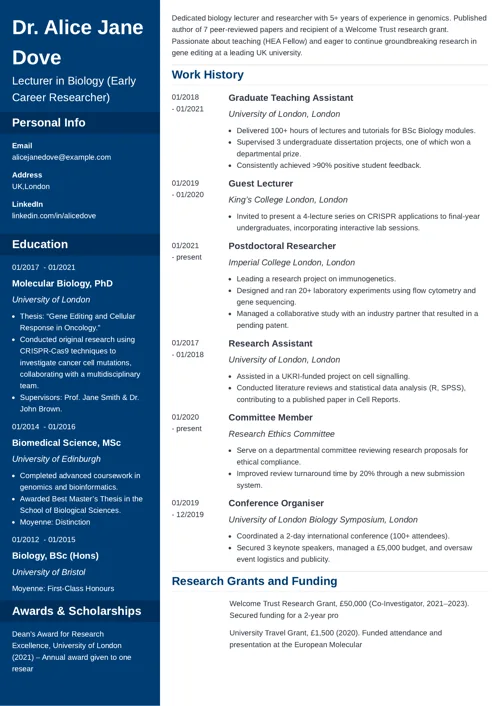Academic CV Example and Guide (UK Edition)
Create your CV nowvApplying for academic jobs isn’t like applying for other roles. Academia is a world unto itself, and this is especially true for academic recruitment in the UK.
An academic CV is a different beast altogether: not limited to two pages, and it must showcase a much deeper record of your scholarly accomplishments. But don’t worry, I’m going to teach you everything you need to know to create an academic CV that gets results.
Read on to learn:
- How to format and structure a UK academic CV, including an example academic CV to model yours on.
- The essential sections of academic CVs, with a few advanced sections that most candidates overlook.
- Pro tips to make your academia CV stand out, from quantifying your achievements to addressing tricky gaps or switching from academia to industry.
- How to tailor your CV for academics, ensuring you meet UK-specific expectations (no photos, please!) and pass any applicant tracking systems along the way.
Want to save time and have your CV ready in 5 minutes? Try our CV builder. It’s fast and easy to use. Plus, you’ll get ready-made content to add with one click. See 20+ CV templates and create your CV here.
Sample CV made with our builder—See more templates and create your CV here.
One of our users, Nikos, had this to say:
[I used] a nice template I found on Zety. My CV is now one page long, not three. With the same stuff.
Academic CV example
Dr. Alice Jane Dove
Lecturer in Biology (Early Career Researcher)
London, UK
alicejanedove@example.com
linkedin.com/in/alicedove
Personal Profile
Dedicated biology lecturer and researcher with 5+ years of experience in genomics. Published author of 7 peer-reviewed papers and recipient of a Welcome Trust research grant. Passionate about teaching (HEA Fellow) and eager to continue groundbreaking research in gene editing at a leading UK university.
Education
PhD in Molecular Biology
University of London
2017–2021
- Thesis: “Gene Editing and Cellular Response in Oncology.”
- Conducted original research using CRISPR-Cas9 techniques to investigate cancer cell mutations, collaborating with a multidisciplinary team.
- Supervisors: Prof. Jane Smith & Dr. John Brown.
MSc in Biomedical Science
University of Edinburgh
2014–2016, Distinction
- Completed advanced coursework in genomics and bioinformatics.
- Awarded Best Master’s Thesis in the School of Biological Sciences.
BSc (Hons) Biology
University of Bristol
2012–2015
- First-Class Honours
Research Grants and Funding
- Welcome Trust Research Grant, £50,000 (Co-Investigator, 2021–2023). Secured funding for a 2-year project on gene therapy techniques, contributing to grant writing and leading experiment design.
- University Travel Grant, £1,500 (2020). Funded attendance and presentation at the European Molecular Biology Conference in Paris.
Awards & Scholarships
- Dean’s Award for Research Excellence, University of London (2021) – Annual award given to one researcher for outstanding PhD research contributions.
- University of Edinburgh Graduate Scholarship (2015–2016) – Merit-based full scholarship covering MSc tuition.
Teaching and Supervision Experience
Graduate Teaching Assistant
University of London
2018–2021
- Delivered 100+ hours of lectures and tutorials for BSc Biology modules.
- Supervised 3 undergraduate dissertation projects, one of which won a departmental prize.
- Consistently achieved >90% positive student feedback.
Guest Lecturer
King’s College London
2019–2020
- Invited to present a 4-lecture series on CRISPR applications to final-year undergraduates, incorporating interactive lab sessions.
Research Experience
Postdoctoral Researcher
Imperial College London
2021–Present
- Leading a research project on immunogenetics.
- Designed and ran 20+ laboratory experiments using flow cytometry and gene sequencing.
- Managed a collaborative study with an industry partner that resulted in a pending patent.
Research Assistant
University of London
2017–2018
- Assisted in a UKRI-funded project on cell signalling.
- Conducted literature reviews and statistical data analysis (R, SPSS), contributing to a published paper in Cell Reports.
Administrative and Leadership Experience
Committee Member
Research Ethics Committee
2020–Present
- Serve on a departmental committee reviewing research proposals for ethical compliance.
- Improved review turnaround time by 20% through a new submission system.
Conference Organiser
University of London Biology Symposium
2019
- Coordinated a 2-day international conference (100+ attendees).
- Secured 3 keynote speakers, managed a £5,000 budget, and oversaw event logistics and publicity.
Publications
- Dove, A. J., & Smith, J. (2022). “Genome Editing Strategies in Oncology.” British Journal of Cancer, 128(4), 556–572.
- Dove, A. J., Brown, J., & Nguyen, T. (2021). “CRISPR-Cas9 Delivery Methods – A Review.” Journal of Molecular Biology, 430(2), 115–127.
- Dove, A. J. (2021). “Ethical Considerations in Gene Editing” – Chapter in Advances in Bioethics (Eds. Wright & Singh). (In press).
- Dove, A. J. (2023). “New CRISPR Applications in Oncology.” Manuscript under review at Nature Biotechnology.
Conference Presentations
- Invited Speaker: “Editing Genes, Editing Lives,” at European Genetics Congress 2023 (Berlin).
- Oral Presentation: “CRISPR as a Cancer Therapy Tool,” at UK Molecular Biology Conference 2022 (Cambridge).
- Poster: “Cellular Response to Gene Editing,” at University of London Research Showcase 2021 – Winner: Best Poster Award.
Evidence of Esteem
- Peer Reviewer for Journal of Molecular Biology and Nature Genetics (2020–Present). Reviewed ~10 manuscripts, providing expert feedback in the field.
- Editorial Board Member, International Journal of Genomics (2023–Present). One of 15 selected early-career scientists guiding journal content.
- Session Chair, Genomics Panel at European Molecular Biology Summit 2022. Invited to lead a panel discussion alongside renowned professors.
Professional Memberships
- Member, Genetics Society UK (2018–Present)
- Fellow, Higher Education Academy (FHEA) (Achieved 2022)
- Member, Royal Society of Biology (2020–Present)
Technical and Laboratory Skills
- Laboratory: CRISPR-Cas9 gene editing, Flow Cytometry, qPCR, Cell Culture Techniques
- Data Analysis: R, Python, SPSS, Prism (statistical analysis and visualisation)
- Methodologies: Experimental Design, Systematic Literature Review, Qualitative Interviewing
Training and Certifications
- PGCAP – Postgraduate Certificate in Academic Practice (2022), University of London.
- Completed HEA Fellowship Training Programme (Advance HE, 2022).
- Workshop: “Advanced CRISPR Techniques” (EMBL Course, 2021).
Languages
- English – Native
- Spanish – Upper Intermediate (B2 CEFR)
References
- Prof. Jane Smith – Professor of Molecular Biology, University of London (Email: jane.smith@uni.lon.ac.uk)
- Dr John Brown – Senior Lecturer, Imperial College London (Email: j.brown@imperial.ac.uk)
(Additional references available on request.)
Looking for more general CV-writing advice or guides for other roles? Read more here:
- How to Write a CV
- Skills-Based CV Format
- Student CV Example & Guide
- Graduate CV Example & Guide
- Medical CV Example & Guide
Now, let’s break down how to write an academic CV that lands you the academic post you’re aiming for:
What exactly is an academic CV?
An academic CV is a detailed document you should use to apply for research or lecturer positions. It showcases your teaching experience, research experience, publications, grants, fellowships, awards, professional associations, and any other evidence of your academic prowess.
An academic CV is much more comprehensive than a standard CV, because it has to prove you’re the top candidate for a specific academic or research position in every possible way.
💡 Expand your knowledge on job applications even more: What is a CV
1. Use the right academic CV format
The foundation of an academic CV is the standard reverse-chronological format (most recent qualifications and experience first), but with extra sections “bolted on” to cover all your scholarly achievements. The end result looks very different from an ordinary job CV.
First impression matters, so make that first page count. Your most impressive qualifications and achievements (e.g. your profile, latest degree, key grants or publications) should appear on page one to grab attention. Make it clear, at a glance, that you’re a stellar candidate worth shortlisting.
Typical academic CV sections
There’s no universally fixed order for academic CV sections, and you should adapt the structure to showcase your strengths best.
📖 Most strong UK academic CVs include the following sections:
- Contact details
- Personal profile
- Education section
- Research grants and funding
- Awards and scholarships
- Teaching and supervision experience
- Research experience
- Administrative/leadership experience
- Publications
- Conference presentations and posters
- Evidence of esteem
- Professional memberships
- Research, technical, and/or laboratory skills
- Training and certifications
- Languages
- References
Omit any sections that don’t apply to you, and reorder sections based on what’s most relevant. For example:
- If you’re aiming for a research-intensive role, and you’ve secured a significant grant, you might position “Grants & Funding” higher up.
- If teaching is a key component of the role, your teaching experience should be featured early.
Academic CV format tips
As an academic, you uphold rigorous standards in how your work is presented. The same level of polish is expected in the way you format your CV.
➡️ Here are some quick CV layout tips:
- Use a clear, professional font (Calibri, Cambria, Helvetica, etc.) at 11–12 pt for body text.
- Keep margins about 1 inch, and use bold sparingly for section headings or key points (e.g., bold your name).
- Maintain a clean, text-focused design that’s easy to read. Avoid clutter with fancy graphics or tables.
- Left-align your text with ample white space between sections and entries.
- Maintain the same style for similar elements. Consistency looks professional and helps readers parse information quickly.
- Save and send your CV as a PDF unless instructed otherwise. This keeps your formatting intact on any device.
Now, the length: an academic CV length is not strictly limited to two pages:
- Early-career academics (like PhD candidates or postdocs) can include 2–3 pages without issues.
- More senior academics (seeking lectureships or fellowships) might go for 4–5 pages or even more.
However, concise and relevant content is still king. Don’t pad it out with fluff; busy academics won’t read a 10-page opus. I’d recommend a 5-page CV as a reasonable upper limit before moving extra content (like a complete list of publications) to an appendix or separate document.
💡 Pro tip: Use the same terminology as the job description when labelling sections and describing your experience. If the post asks for “evidence of esteem” or highlights the importance of teaching, make sure your section titles and content reflect those keywords. This tailoring not only impresses human readers but also helps your CV get picked up by Applicant Tracking System (ATS) software.
2. Highlight contact details in your academic CV
This part is simple but essential. After all, you want to ensure the readers clearly know whose CV they’re viewing, and how they can easily contact you.
📝 At the very top of your academic CV, include:
- Your name in a larger font (4–6 points bigger than your body text). If you have a doctoral or professional title, you can include post-nominals (e.g., Dr. Alice Dove or Alice Dove, PhD).
- Professional title, right below your name. You might add a title or descriptor like PhD Candidate in Chemistry, Lecturer in Modern History, or Research Fellow. This immediately tells the reader who you are.
- Email address: a professional one, ideally your university or alumni email.
- Phone number with the correct international format if applying outside your country.
- LinkedIn profile or personal academic website, if it’s up to date with your publications and achievements.
- City and country: in the UK, it’s common to omit full addresses for privacy and space; city and country (or county) suffice.
Lastly, do not add a headshot photo to your UK academic CV unless specifically requested (which is extremely rare for academic roles in the UK). Similarly, you don’t need to list personal details like date of birth or marital status. Stick to professional contact info only.
💡 Pro tip: You also don’t need to write “Curriculum Vitae” or “CV” at the top of the document. It’s quite obvious that your document is a CV. Adding “CV” as a heading is an outdated practice (more common in the US) and seems unnecessary, like wearing a T-shirt that literally says “T-Shirt” on it. Use that space for your name or other important information instead.
3. Describe your educational background in detail
In an academic CV, the education section is absolutely crucial and usually appears on the first page (often right after your profile). Academic recruiters will focus on your degrees, especially your highest qualification.
✅ Here’s how to do it right:
- List your degrees in reverse-chronological order, with the most recent first.
- For each degree, mention: degree name, institution, location, and years of study or expected graduation.
- Include your degree result or expected result if it’s strong (e.g., Distinction, Merit, First-Class Honours, 2:1). For current studies, you might mention “on track for a First”.
- Mention relevant modules or coursework selectively. Focus on what supports your case.
- List scholarships or academic awards. If you have multiple items, placing them in an Awards section makes it cleaner.
- List any milestones achieved (e.g., “Passed upgrade/transfer viva, 2023”).
☑️ If you’re working on a PhD or a research degree, add extra details:
- Include a brief research synopsis, thesis title, and 1–3 lines on focus or findings. Treat it like a mini abstract, highlighting your research, methodology, and key results, showcasing your skills and techniques.
- Include your PhD supervisor(s) and, if relevant, your master’s thesis on your CV. This links you to a research lineage or school. A well-known supervisor positively reflects on you and can assist your references.
Remember, on an academic CV, your PhD is often as important as your work experience. Give it the prominence it deserves. You could even include a sub-section like “PhD Research” under education to emphasise it.
💡 Pro tip: Always prioritise what sells you best for the role at hand. If you’re an early-career researcher, your education section will likely be near the top and quite detailed. If you’re a very seasoned academic with a long list of publications and grants, your education will still be on the first page, but it might occupy less space relative to your other achievements.
4. Select custom academic CV sections
Once you’ve covered the basics (contact details, profile, education), these additional sections are what make your CV truly academic. They demonstrate your research output, teaching contribution, and standing within the scholarly community. Include only the sections that apply to you, and prioritise those most relevant to the role.
👉 Common custom academic CV sections include:
- Research grants and funding – Grants and fellowships can show your ability to attract research funding.
- Awards and scholarships – Academic prizes, honours, and competitive scholarships that signal excellence and recognition.
- Teaching and supervision experience – Levels taught, assessment duties, supervision, and any teaching qualifications or fellowships (e.g. HEA).
- Research experience – Postdoctoral roles, assistantships, or major projects, highlighting methods, responsibilities, and outcomes.
- Administrative and service experience – Committee work, event organisation, outreach, and academic citizenship.
- Publications – Peer-reviewed outputs such as journal articles, books, chapters, and proceedings, formatted consistently and clearly.
- Conference presentations and posters – Talks, posters, and workshops demonstrate active engagement with your field.
- Evidence of esteem – Proof of professional recognition, such as peer review roles, invited talks, editorial work, or invited collaborations.
- Professional memberships – Memberships in professional bodies, including any offices held.
- Research, technical, or laboratory skills – Relevant methods, techniques, tools, and specialist skills, grouped logically for clarity.
- Training and certifications – Teaching, research, compliance, or professional development training not covered elsewhere.
- Language skills – State proficiency levels (ideally using CEFR); they’re especially valuable for international research, teaching, or fieldwork.
- References – Academic and/or professional referees, typically 2–3, with full names, titles, affiliations, and contact details.
Choose and order these sections strategically for each application. A tailored structure helps hiring committees quickly see why you’re a strong fit for this role, not just a strong academic overall.
💡Pro tip: First impressions matter, but last impressions can be just as powerful. The references section at the end of your CV acts as social proof; respected academics' names can leave a positive impression. Don’t treat this as a throwaway section; ensure it’s well-formatted and aligned with your CV style.
5. Write an academic CV personal statement
Your academic personal statement (also called a personal profile or research summary) is like the abstract of a research paper. Use it to hook the reader. Customise it to the specific position – avoid using a one-size-fits-all approach.
⏩ How to write an academic CV profile:
- Make a list of all your strengths and achievements as an academic and/or researcher. Consider all of the professional experience, skills, and abilities that make you excel in your field.
- Then read the job description in the advert and match 3–4 points from your list to the skills and experience that are required for the role.
- Use these points to write a personal profile targeted to the academic job or research post you’re applying for.
- Quantify whenever possible to give concrete evidence of your achievements.
- Use action verbs to boost the readability of your profile.
🔎 Your statement should answer these questions:
- Who are you? For example, “Lecturer in X with Y years’ experience…”
- What can you offer? For example, your research focus, key publications or grants, and teaching experience.
- What are your career goals, or why are you applying? For example, the research you want to pursue at this institution or how you plan to contribute to their department.
Even though this CV section goes right underneath your CV header, the best approach is to write it last, after you’ve put together the rest of your CV. That way, you can accurately compress all those details into a punchy intro.
Having trouble? Don’t worry, it’s a challenging section. Here are a couple of academic CV personal statement examples to inspire you:
Academic CV: example of a personal statement in a PhD application
MA student in English Literature at Aberystwyth University, on track to graduate with Distinction. Seeking to build on my MA thesis (focused on 19th-century Welsh folklore in Victorian literature) by pursuing a PhD researching how regional myths influence national literary canons. Proven research skills with two published articles in peer-reviewed journals. Eager to join Cardiff University’s Folklore Studies department to study the interplay of Welsh and English literary traditions under Dr. Smith.
🔎 This profile:
- Quickly establishes the candidate’s background: MA student with top grades,
- Mentions their research focus and success – published work on a niche topic,
- States their specific goal: a PhD in a related area, at a specific department, under a particular supervisor.
- It’s tailored and shows scholarly potential.
See two more examples for inspiration:
Academic CV: sample personal statement for a lecturer
Passionate researcher and lecturer in English Literature with 10+ years of experience in higher education. Author of two books on the legacy of Southern Gothic fiction in contemporary media. Experienced in curriculum design and supervision of BA and MA dissertations (HEA Fellow). Currently seeking a Senior Lecturer position to contribute my expertise in 19th and 20th-century literature and develop innovative modules that blend literary analysis with digital media.
Sample academic CV: personal statement for a master’s application
BSc Psychology student at University of Exeter, on course to graduate with first-class honours. Aiming to pursue an MSc in Social and Organisational Psychology to build on my undergraduate research into prosocial behaviour and its effects on workplace dynamics. Skilled in statistical analysis (SPSS, R) and experienced in conducting qualitative interviews as part of a year-long research project. Eager to research social cohesion strategies under the guidance of Exeter’s renowned faculty in this field.
💡Pro tip: A personal profile in an academic CV is complementary to your cover letter. Avoid overly subjective statements or discussing why the institution appeals to you, as all that belongs in your cover letter. The CV profile is more factual, focusing on your academic identity and accomplishments in a nutshell.
When making a CV in our builder, drag & drop bullet points, skills, and auto-fill the boring stuff. Spell check? Check. Start building a professional CV template here for free.
When you’re done, Zety’s CV builder will score your CV and tell you exactly how to make it better.
6. Write a tailored academic cover letter
Finally, no academic job application is complete without an academic cover letter. It’s where you connect the dots between your academic CV and the job’s requirements, and you convey your fit and enthusiasm for that specific position. These documents must work in tandem: your CV is the factual evidence of your merit, while the cover letter is your personal narrative and sales pitch.
📝 Follow these tips to write a strong cover letter:
- Use proper academic letter format, including addresses, date, formal salutation, and polite closing.
- Begin with a compelling hook. Express enthusiasm for the role and institution, leading with your top credentials to show relevant expertise and genuine interest.
- Address it personally and specifically, ideally to the chair of the hiring committee or head of department. This personal touch makes a positive impression, as brains light up when hearing their own name.
- Connect your experience to the job requirements. Essentially, answer the question: “Why you for this job, at this university, and what will you do there?”
- Highlight a key achievement with more narrative. Such details are more memorable than bullet points.
- Show enthusiasm and fit by understanding department needs and future goals.
- Mention your plans, especially for faculty roles. Show long-term commitment.
- Keep your closing concise and positive. Thank them for considering your application and express interest in discussing your candidacy further.
- Don’t rewrite your CV in prose; instead, interpret and highlight it in the context of the job.
Remember, the cover letter is personal marketing – don’t be shy to promote yourself a little, and make sure to tailor it each time. A generic cover letter won’t do, especially in academia, where each position can be quite different and specific.
Plus, a great cover letter that matches your CV will give you an advantage over other candidates. You can write it in our cover letter builder here. Here's what it may look like:
See more cover letter templates and start writing.
Key takeaways
Let’s recap the most important points about crafting a top-notch academic CV for the UK:
- Use the proper academic CV format: Follow a reverse-chronological structure with scholarly sections like grants, publications, and teaching. Keep it polished, clear, and tailored to your strongest credentials.
- Include an in-depth education section with research details: List degrees in reverse order, emphasising your PhD with a short research summary and key milestones. Include supervisors, thesis details, and awards.
- Add custom academic CV sections: Showcase research grants, awards, teaching, and research experience. Add administrative, publication, and conference sections to highlight your scholarly impact.
- List your references: Provide 2–3 academic referees with full contact details and roles. Always seek permission and keep them informed of your applications.
- Write a tailored personal statement: Summarise who you are, your expertise, and goals, all tailored to each role. Write it last for best alignment with your academic CV content.
- Pair your academic CV with a well-written cover letter: Together, they should tell a compelling story of where you’ve been, what you’ve accomplished, and where you’re headed, and why that next department or university will benefit from having you.
Good luck with your academic job hunt! And remember, every great academic career starts with a single application – you’ve got this.
About Zety’s Editorial Process
Our editorial team has thoroughly reviewed this article to ensure it follows Zety’s editorial guidelines. Our dedication lies in sharing our expertise and providing you with actionable career advice that offers you real value. Every year, the quality of our content attracts 40 million readers to our site. But that’s not all – we conduct original research to gain a detailed understanding of the labour market. We take pride in being cited by top universities and leading media outlets in the UK and worldwide.
Sources
- Jasmin Bergeron, Jean-Mathieu Fallu, Jasmin Roy, "A Comparison of the Effects of the First Impression and the Last Impression in a Selling Context"
- Nadiia Chervinska, "White Space in Design: Using Negative Space to Create Harmony in Your Visuals"
- Amherst College: The Benefits of Being Bilingual
- The CEFR Levels
- Dennis P Carmody, Michael Lewis, "Brain Activation When Hearing One’s Own and Others’ Names"







